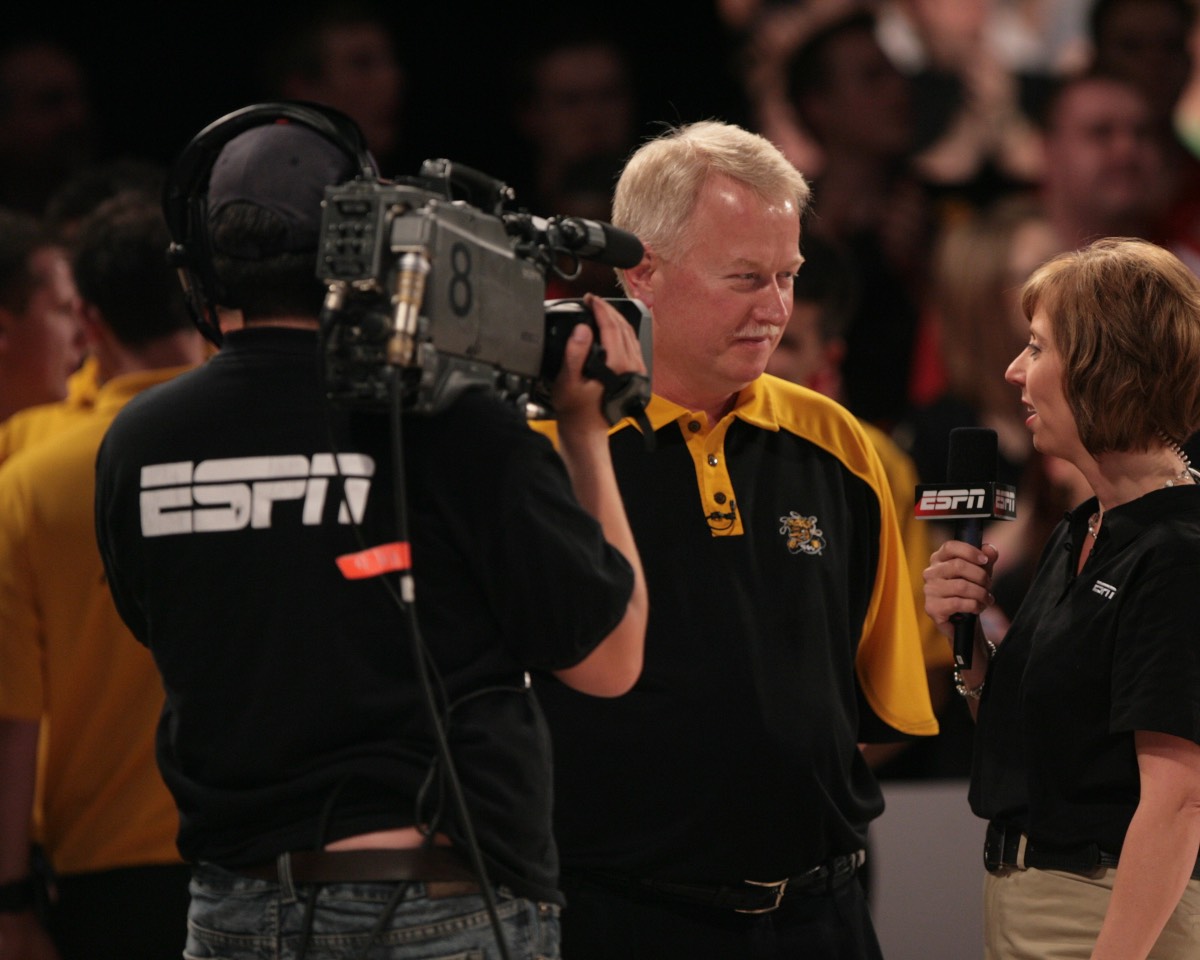After 40-plus years with the program, Gordon Vadakin retired this month as Wichita State’s head bowling coach, ending an association that began as a bowler in 1973 and moved to coaching in 1976.
His accomplishments include 18 team national championships, 145 National Collegiate Bowling Coaches Association All-Americans and 239 Academic All-Americans. In 2012, the Bowling Coaches Hall of Fame inducted Vadakin and called him “perhaps the most successful collegiate bowling coach of all time.”
Those honors, however, are not the most important part of Vadakin’s legacy at Wichita State.
“When I transferred from another college to Wichita State, I had no idea the impact that Gordon and the university would have on my life,” former bowler Josh Blanchard (2008-10) wrote in an email. “There were days while at school we had meetings with Gordon that I could replay word for word everything he said. I remember those words because they were so impactful on me and my maturation process. I wouldn’t be who I was today without those words.”
Vadakin, a native of Wichita, bowled on Team USA in 1983 and 1989. He won two U.S. Bowling Congress National Open Championship titles and is a member of the USBC Hall of Fame.
“Ultimately, words cannot describe the level of influence and importance GV has played in my life,” wrote former bowler Chris Greene (2002-06). “Gordon spent hours upon hours of developing us, not just as students of the game, but students of life. Teaching us how to be great humans, on and off the lanes. Being loyal, hardworking and how to be great team players are a sample of the qualities GV worked to instill in us.”
Vadakin will spend much of his time with his family. He wants to travel with Cindy, his wife. He has two grandchildren (children of his daughter Andrea and her husband Raja). Son Kenny recently married Cara.
Wichita State bowler (1989-92)
Ryan, Vadakin’s grandson, is 2 and has a rare genetic disorder that requires constant care.
“He’s a wonderful kid,” Vadakin said. “It’s an-all-hands-on-deck deal with his care. For a while, that’s filling our days.”
Mark Lewis, formerly the women’s coach, will take Vadakin’s job as director of the bowling program. Holly Harris will continue with the program and coach the women’s team and Rick Steelsmith is joining the program to coach the men’s team.
Vadakin took time during his final week as bowling coach to answer questions about his career and his future.
Q: How do you feel about the future of Shocker bowling?
“I gave this a tremendous amount of thought and an awful lot of work. Bringing in Steelsmith is a huge move for our program. We have an opportunity to go way beyond where we’ve been and elevate the program to a competitive level that we’ve not seen before.
We’ve always set the standard. This is way harder than it used to be. This is a team that can up that game and put us at a new standard in college bowling. I’m pretty excited to see what they can do.”
Q: How has college bowling changed?
“Way more programs. Way more parity. We were kind of on the leading edge on all of this. Anybody that was decent was always looking at us. Now, I think they still look at us, but they have so many more options.
The NAIA schools, I think, have more flexibility (with financial aid) on how they can structure things. We’ve seen a massive explosion in NCAA programs. It’s incredibly competitive. I never thought I was going to have to compete this hard off the lanes to get (a recruit) to look at us. We have worked incredibly hard to be more visible, to be more relevant, to get more word out there as to what this program, what this school has to offer.
I think what we’ve got, far and away, is better than anyone else. Competition makes you better. We’ve tried to improve our message and how we deliver it.”
Q: Why did you attend Wichita State?
“I went to Southeast High (School) here in town. Going to Wichita State seemed like the right thing to do. I didn’t even try out for the bowling team in the fall of 1971. I knew we had one, but I didn’t know much about, although I bowled here locally in youth leagues. It was really Paul (Waliczek) who recruited me, so to speak, to be on the team.
Luckily, Paul involved me in this. I just fell in love with bowling at this level. It’s the most fun, most pure, most natural part of our sport.
Everything that’s good about bowling is all wrapped up within the collegiate bowling side of things.”
Wichita State bowler (1988-92)
Q: Why do you feel so strongly about college bowling?
“You’re not competing for money, so it’s not about that. There’s nothing like the pride you feel when you compete for your own university, you compete for the sheer honor of representing your school. You play for the love of the game, the passion of the game, your teammates. It’s all of the things that are inherent in any college sport.
Being exposed to it hooked me very deep. Obviously, it was hard to leave.”
Q: Will you stay involved in bowling?
“I don’t know if I will be. It will be hard to do anything other than (coach at WSU). You get a lot out of this. The rewards of seeing people develop and grow is probably the great thing here. It’s not national titles or stuff like that. It’s seeing them grow into contributing members of society, and I got a tremendous amount of those kind of responses from our alumni.”


 File photo
File photo